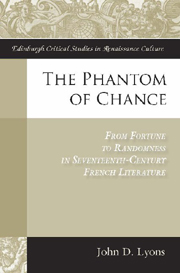Book contents
- Frontmatter
- Contents
- Preface: The Phantom of Chance
- Acknowledgements
- Series Editor's Preface
- Introduction
- 1 Fortune, Mistress of Events: Corneille and the Poetics of Tragedy
- 2 God in a World of Chance: Pascal's Pensées and Provincial Letters
- 3 From Chance Events to Implausible Actions: Lafayette and the Novel
- 4 The God of Suspense: Bossuet's Providential History and Racine's Athalie
- 5 An Accidental World: La Bruyère's Characters
- Conclusion
- Bibliography
- Index
3 - From Chance Events to Implausible Actions: Lafayette and the Novel
Published online by Cambridge University Press: 12 September 2012
- Frontmatter
- Contents
- Preface: The Phantom of Chance
- Acknowledgements
- Series Editor's Preface
- Introduction
- 1 Fortune, Mistress of Events: Corneille and the Poetics of Tragedy
- 2 God in a World of Chance: Pascal's Pensées and Provincial Letters
- 3 From Chance Events to Implausible Actions: Lafayette and the Novel
- 4 The God of Suspense: Bossuet's Providential History and Racine's Athalie
- 5 An Accidental World: La Bruyère's Characters
- Conclusion
- Bibliography
- Index
Summary
If Corneille's career marked the transition from the tragi-comedy to tragedy, Marie-Madeleine de Lafayette's work has been enshrined in literary history as the quintessential example of the shift from ‘romance’ to ‘novel’. These generic transformations in dramatic literature and prose narrative are not unrelated. As we saw, the tragi-comedy often took its stories from popular fiction, and the adjective romanesque clung to many such dramatic works as a way of emphasising the presence of implausible and, especially, fortuitous incidents in the plots. So it is significant that when Lafayette was asked about the book that later established her in the literary canon, The Princess of Cleves, she felt that it was important to say that this text is not ‘romance-like’ (romanesque):
And especially, what I find there is a perfect representation of the world of the court and of the way in which one lives there. There is nothing romance-like and overdone; in fact, it is not a romance; to be precise, these are memoirs. And that was, from what I was told, the title of the book, but it was changed.
The Shipwreck of Romance
Several years before writing The Princess of Cleves, Lafayette had, however, written a romance, Zayde (1670), a story full of the adventures and surprises that mark the genre. In fact, it may be so romanesque precisely because it was either a kind of farewell to the genre, already in decline, or even, as Nicholas Paige suggests, a parody of romance.
- Type
- Chapter
- Information
- The Phantom of ChanceFrom Fortune to Randomness in Seventeenth-Century French Literature, pp. 104 - 134Publisher: Edinburgh University PressPrint publication year: 2011



